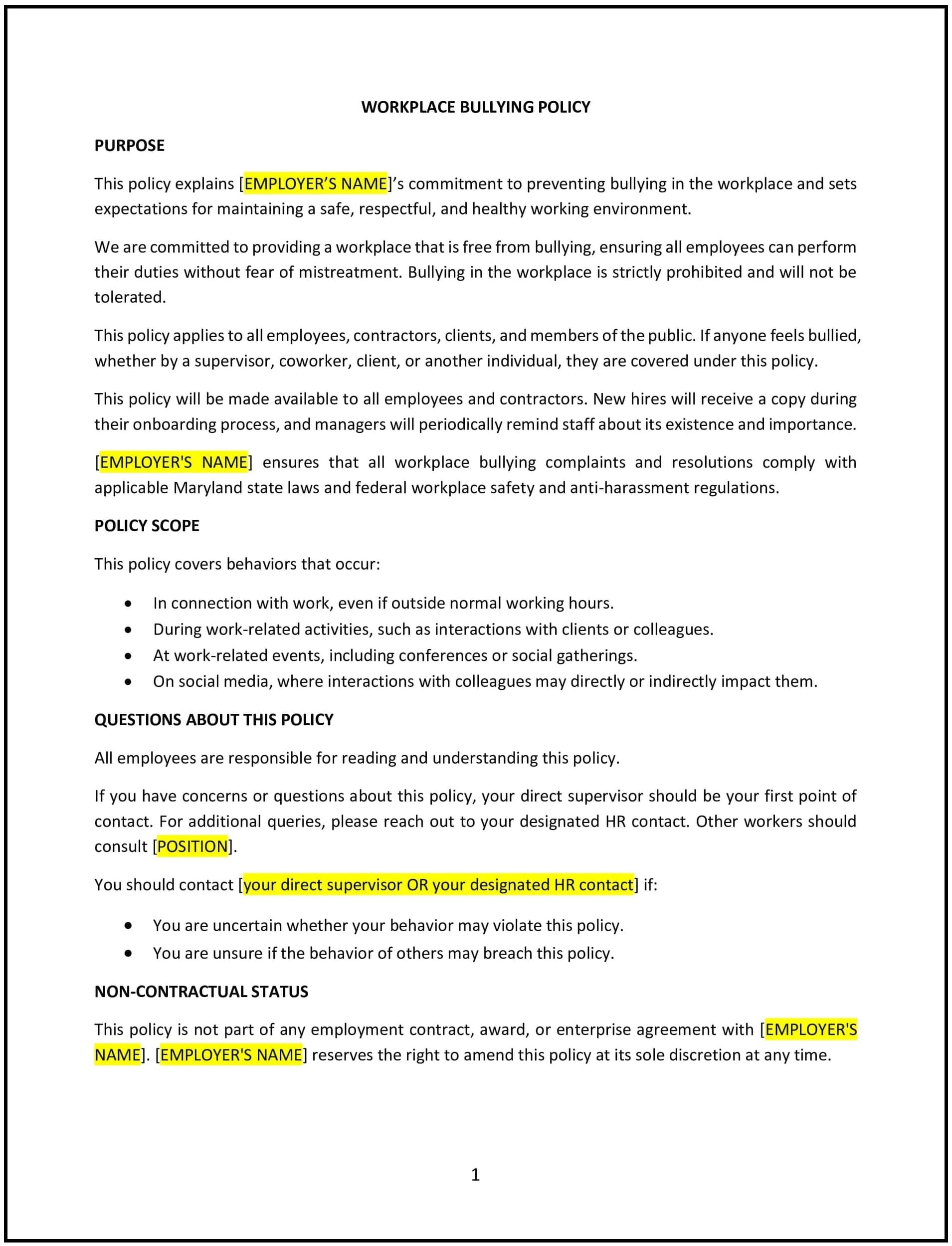Workplace bullying policy (Maryland): Free template
Got contracts to review? While you're here for policies, let Cobrief make contract review effortless—start your free review now.

Customize this template for free
Workplace bullying policy (Maryland)
This workplace bullying policy is designed to help Maryland businesses foster a respectful and professional environment by preventing and addressing bullying behavior in the workplace. It defines what constitutes workplace bullying, sets clear expectations for employee behavior, and provides a process for reporting and resolving incidents of bullying.
By adopting this policy, Maryland businesses can maintain a positive work environment, reduce employee conflicts, and promote healthy, productive relationships among employees.
How to use this workplace bullying policy (Maryland)
- Define workplace bullying: Clearly outline what constitutes bullying behavior, such as verbal abuse, intimidation, humiliation, or any other act that creates a hostile or abusive work environment.
- Set a zero-tolerance policy: Emphasize that workplace bullying will not be tolerated and that all employees are expected to behave with respect and professionalism at all times.
- Outline the reporting process: Specify how employees should report bullying incidents, including the use of formal or informal reporting channels, such as HR, supervisors, or anonymous reporting systems.
- Address investigation procedures: Describe how the business will investigate claims of bullying, including timelines, confidentiality, and the process for determining the severity of incidents.
- Set consequences for bullying: Detail the potential disciplinary actions for individuals found to have engaged in bullying behavior, ranging from warnings to termination, depending on the severity of the incident.
- Reflect Maryland-specific considerations: Ensure the policy aligns with Maryland laws related to workplace behavior, harassment, and employee protection.
Benefits of using this workplace bullying policy (Maryland)
Implementing this policy provides Maryland businesses with several advantages:
- Promotes a respectful work environment: Reduces the risk of workplace conflict by setting clear behavioral expectations and offering a structured process for addressing complaints.
- Enhances employee well-being: Helps create a safe and supportive workplace where employees feel valued and protected from harmful behavior.
- Improves productivity: A positive work environment leads to higher employee engagement, lower absenteeism, and better overall performance.
- Reduces legal risks: By addressing bullying proactively, businesses can minimize the risk of legal action, such as harassment claims, and maintain a compliant work environment.
- Aligns with Maryland regulations: Supports compliance with Maryland laws regarding workplace harassment, employee safety, and workplace rights.
Tips for using this workplace bullying policy (Maryland)
- Communicate the policy clearly: Ensure that all employees are aware of the policy through onboarding, training, and regular reminders about acceptable behavior in the workplace.
- Provide training: Offer training to all employees and managers on how to recognize and address bullying behavior, fostering a more aware and proactive work environment.
- Encourage early reporting: Encourage employees to report bullying as soon as possible to prevent escalation and address the issue in a timely manner.
- Monitor the work environment: Regularly assess the workplace for signs of bullying or toxic behavior, and take action to resolve issues before they escalate.
- Review regularly: Periodically review the policy to ensure it reflects any changes in Maryland laws or business practices and to assess its effectiveness.